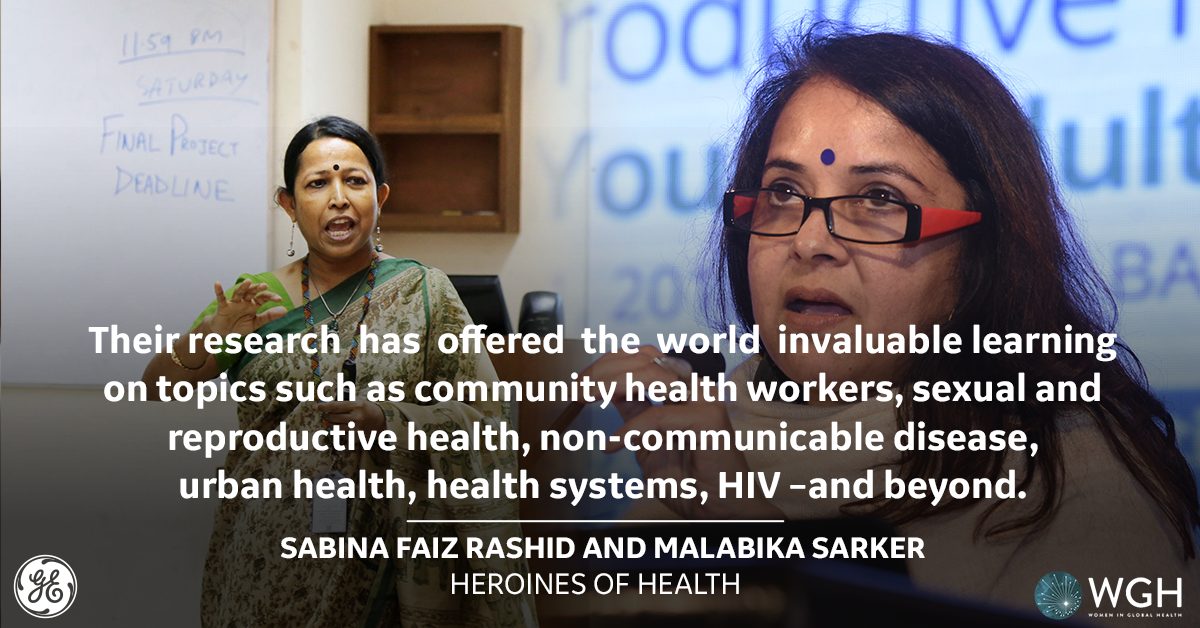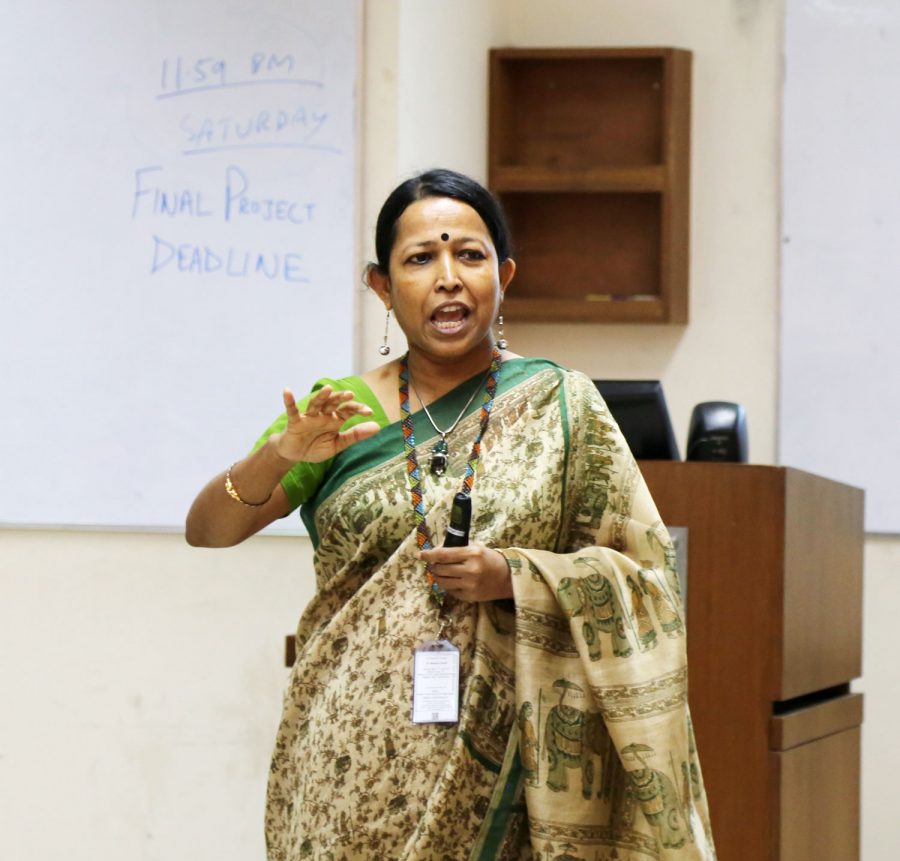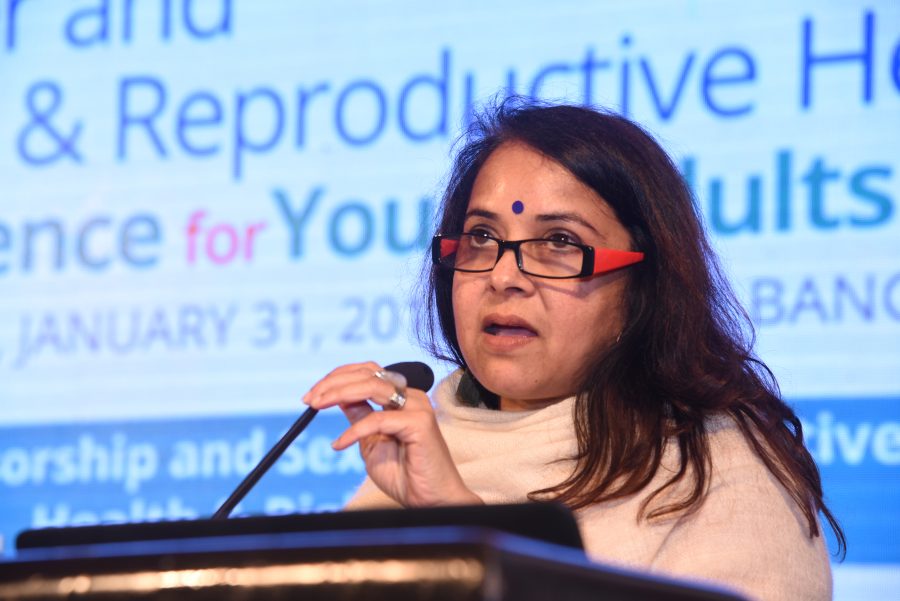These Heroines of Health are inspiring the next generation of global health workers

At the World Health Assembly this year, GE Healthcare and Women in Global Health, a movement that strives for greater gender equality in global health leadership, are joining forces to honor and celebrate women in global health. 2018 Heroines of Health, Professor Sabina Faiz Rashid and Professor Malabika Sarker are being honored this year for their work with vulnerable populations in Bangladesh. Both have strong academic backgrounds; Sabina is the first female Dean of the BRAC James P Grant School of Public Health, appointed in 2013, and Malabika is the first female Director of Research. Their partnership and collaboration is key to their leadership and is inspiring the next generation of global health workers. Their research has offered the world invaluable learning on topics such as community health workers, sexual and reproductive health, non-communicable disease, urban health, health systems, HIV – and beyond.
Tell us more about the work that you do with your organizations.
Sabina: I head the BRAC School of Public Health in Bangladesh. We have transformed our Masters of Public Health (MPH) so that students learn first-hand in the community. My colleague and friend of over twenty years, Professor Malabika Sarker, shares my vision to transform public health advocacy for developing world needs. I have also focused on gender, sexual and reproductive health, and the health needs of people in urban slums. In 2008, I established a Centre for Gender and Sexual and Reproductive Health and Rights with seed funding from a UN organization, pushing for laws to stop child marriage; providing a safe space for LGBTQI communities and working to develop online resources on sensitive topics that bypass traditional gatekeepers such as parents and teachers. I also established the Centre for Urban Health and Equity in Dhaka, a city of 16 million with 5 million poor. Slum settlements remain invisible to the state – there is no comprehensive urban policy, and the poor lack housing rights, basic services, and suffer from the worst health indicators.
Malabika: I teach, conduct research, and oversee research activities as Director of Research. I coordinate and teach various modules, such as the implementation research and a reproductive health course. I also lead the Center of Excellence for Science of Implementation and Scale Up committed to evidence generation. As a member of the senior management committee, I also oversee the finance and human resource in partnership with the Dean of the school. I regularly mentor 27 researchers working with me on several research projects. For several years, I also worked as a public health physician in BRAC, the largest Non-Government Organization in the world. After completing my doctorate, I startedworking as a researcher/teacher which I’ve now been doing for 13 years.
How did you get involved in this work; what was your inspiration?
Malabika: When I was 17, I got married. It was an arranged marriage. My husband and my father decided that I should go to medical school even though I was interested in studying Physics or Mathematics. After a year-long training as an obstetrician and gynecologist post-medical school, I started my career as a community-based reproductive health programmer. One of my primary services was menstrual regulation (MR), which is what abortion is called in Bangladesh. I was surprised by the number of women who came for MR given the availability of free contraceptives. I realized that the availability of a service does not ensure its acceptability, and I became interested in the social factors which determine health. I then joined BRAC where I worked on a community-based maternal mortality reduction project, and so my journey in public health started.

Sabina: When I was 23 years old I got a job at BRAC’s research division in a village called Comilla in Bangladesh. I’d never been to a village before and six months in that village changed my perception of the poor. They were kind and hospitable, welcoming me and my questions with humor and patience. They taught me that local practices were often pragmatic decisions, made with little money and with traditional home practices often the first line of healthcare. Solutions I’d read in books were not so easily applied in real life and I found that the actual needs and priorities in the community were not always heard. This was my motivation. Following this experience, I decided to do my Master’s in primary research on poor women who were using a type of female contraceptive implant in Bangladesh. Many remained uninformed of the implant, side effects and had to fight with doctors to have it removed.
Can you share a story that solidified why you got into this line of work?
Malabika: When I was working for BRAC in Bangladesh, they launched a ‘maternity waiting home’ (MWH) for pregnant women from the remote villages who were diagnosed with complications or thought to be at high risk. In 1993, Banu, a pregnant woman was admitted to the MWH. It was her ninth pregnancy and she had a history of abortion, stillbirth, and neonatal death. With four children, Banu was restless and kept talking about how her children would suffer without her. She left the waiting home after a day. Three days later, we got the news that Banu had been admitted to the hospital with obstructed labor. I ran to the hospital where I learned that the baby was dead and that Banu needed a craniotomy for delivery. Following the craniotomy, when Banu gained consciousness, she left the hospital and the nurses didn’t know where she was. We immediately went looking for her but by the time I reached Banu’s house, I received the news that Banu had passed away as she tried to walk the six kilometers. This was an extremely traumatic experience for me that made me realize the complexity and value of public health and how simply addressing the clinical need of a patient isn’t enough.
Sabina: A life-changing moment for me that also solidified why I got into this line of work was when I spent 15 months conducting ethnographic research in slum settlements in Dhaka city, studying the lives of married and unmarried adolescent girls and their sexual and reproductive health needs. Adolescent women and their families there spoke of a constant worry that pervaded their daily lives and resulted in palpitations, insomnia, chest pains, fevers, and other ailments. I began to reflect on how their experiences challenge our dominant model of health interventions, which are biomedical and disease oriented. Do we often blame the poor for the lack of improvement in their lives, for not accessing appropriate services, or not being compliant about taking certain medications or for certain practices that are deemed as backward, without understanding their social worlds? I realized that public health needs to have a comprehensive approach to meet the needs of the most marginalized. I also learned very quickly that reproductive and sexual health for many of the urban poor adolescent women was much broader; it was the absence of social, economic and political rights that impacted created adverse health conditions. I returned to Bangladesh and joined BRAC School of Public Health. Their mission was in alignment with my growing passion to work in an institution that was committed to improving the lives of disadvantaged communities, especially poor women and children.

What’s the greatest piece of advice someone ever gave you?
Sabina: Whenever I felt intimidated by the brilliant and inspiring individuals who I met, my father, who was always very supportive of me, would say: “Sabina, 99% is aspiration, 1% is inspiration”. Basically, that you don’t have to be brilliant to make a difference, just work hard, remain sincere, committed, and passionate about what you do, and your work will speak for itself.
Malabika: “Be curious, engage, and involve”.
Professor Sabina Faiz Rashid and Professor Malabika Sarker are two of nine women being recognized at this year’s World Health Assembly as part of the Heroines of Health honors. Learn more about the 2018 Heroines of Health here.








